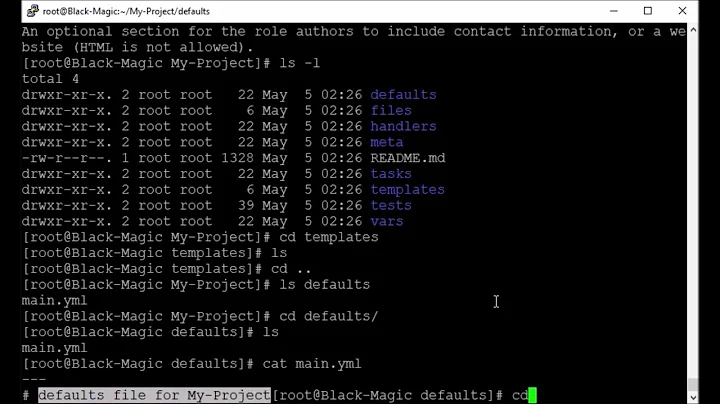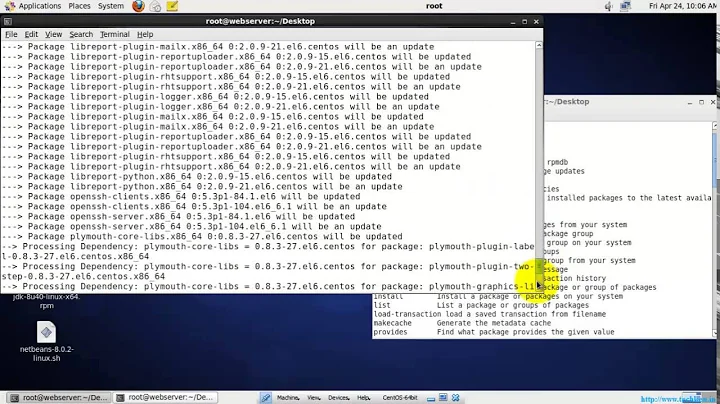How to know from which yum repository a package has been installed?
Solution 1
With yum-utils installed, repoquery will provide the information you seek (here 'epel' being the repository).
$ repoquery -i cherokee
Name : cherokee
Version : 0.99.49
Release : 1.el5
Architecture: i386
Size : 8495964
Packager : Fedora Project
Group : Applications/Internet
URL : http://www.cherokee-project.com/
Repository : epel
Summary : Flexible and Fast Webserver
Description :
Cherokee is a very fast, flexible and easy to configure Web Server. It supports
the widespread technologies nowadays: FastCGI, SCGI, PHP, CGI, TLS and SSL
encrypted connections, Virtual hosts, Authentication, on the fly encoding,
Apache compatible log files, and much more.
Solution 2
What version of yum?
On the current version if the installed package is the same version as the most recent one available then the repo it was installed from is shown.
$ yum info irssi
Installed Packages
Name : irssi
Arch : i586
Version : 0.8.14
Release : 1.fc11
Size : 2.3 M
Repo : installed
From repo : updates
Summary : Modular text mode IRC client with Perl scripting
URL : http://irssi.org/
License : GPLv2+
Description: Irssi is a modular IRC client with Perl scripting. Only text-mode
: frontend is currently supported. The GTK/GNOME frontend is no
: longer being maintained.
$ yum --version
3.2.23
If there is a newer package available, then it will be shown separately, with the new version showing the repo it's available from.
Solution 3
Coming way to late but (at least on Fedora 15) one can use yumdb for similar queries:
yumdb info 'python*'
And what I actually needed to list packages from given repo(s):
yumdb search from_repo 'my-*-repo'
Solution 4
If all else fails, you can inspect the yumdb manually. It's located in /var/lib/yum/yumdb and contains detailed information on every installed package. You'll be particularly interested in from_repo. For example, for the bind-utils package:
# for i in /var/lib/yum/yumdb/b/*bind-utils*/*; do echo $i: `cat $i`; done
/var/lib/yum/yumdb/b/73ea08770fa666e18c59842bf65fa0f3a0b103d8-bind-utils-9.8.2-0.23.rc1.el6_5.1-x86_64/checksum_data: 39f7840f93d3d76825a9e8da79cfe0366f7fad68f018a273477aee62cccfa3f4
/var/lib/yum/yumdb/b/73ea08770fa666e18c59842bf65fa0f3a0b103d8-bind-utils-9.8.2-0.23.rc1.el6_5.1-x86_64/checksum_type: sha256
/var/lib/yum/yumdb/b/73ea08770fa666e18c59842bf65fa0f3a0b103d8-bind-utils-9.8.2-0.23.rc1.el6_5.1-x86_64/command_line: install bind-utils
/var/lib/yum/yumdb/b/73ea08770fa666e18c59842bf65fa0f3a0b103d8-bind-utils-9.8.2-0.23.rc1.el6_5.1-x86_64/from_repo: updates
/var/lib/yum/yumdb/b/73ea08770fa666e18c59842bf65fa0f3a0b103d8-bind-utils-9.8.2-0.23.rc1.el6_5.1-x86_64/from_repo_revision: 1397654451
/var/lib/yum/yumdb/b/73ea08770fa666e18c59842bf65fa0f3a0b103d8-bind-utils-9.8.2-0.23.rc1.el6_5.1-x86_64/from_repo_timestamp: 1397654759
/var/lib/yum/yumdb/b/73ea08770fa666e18c59842bf65fa0f3a0b103d8-bind-utils-9.8.2-0.23.rc1.el6_5.1-x86_64/installed_by: 0
/var/lib/yum/yumdb/b/73ea08770fa666e18c59842bf65fa0f3a0b103d8-bind-utils-9.8.2-0.23.rc1.el6_5.1-x86_64/reason: user
/var/lib/yum/yumdb/b/73ea08770fa666e18c59842bf65fa0f3a0b103d8-bind-utils-9.8.2-0.23.rc1.el6_5.1-x86_64/releasever: 6
To get just the information you want:
# cat /var/lib/yum/yumdb/b/*bind-utils*/from_repo
updates
Later versions will provide even more data; for instance in EL 7 the exact mirror and URL from which the package was downloaded is stored here.
Solution 5
rpm -qi packagename
Will tell you the vendor and packager
Related videos on Youtube
lg.
Updated on September 17, 2022Comments
-
lg. over 1 year
After I have installed a package by yum (with multiple repositories configured), how can I find from which repository it has been installed?
If I run
yum info package-name(oryum list package-name), I can only see that the package is "installed".-
Carlos Abalde over 14 yearsGreat question! I installed yum-utils and tried one it's utils called repoquery, but no luck.
-
 warren over 14 yearssee also serverfault.com/questions/90409/… :)
warren over 14 yearssee also serverfault.com/questions/90409/… :) -
Trevor Boyd Smith over 7 years@warren your link is not useful because your link is a question about "what repo is an rpm stored in" but this question asks "what repo is an INSTALLED rpm from". different questions.
-
Trevor Boyd Smith over 7 yearsif you are used to doing
rpm -qa|grep NAMEthen you can doyum list installed|grep NAMEto find what repo the rpm is from. -
 warren over 7 years@TrevorBoydSmith - 7 years ago, it was close. Today, it's still similar. Never said it was the same. Just that it was related.
warren over 7 years@TrevorBoydSmith - 7 years ago, it was close. Today, it's still similar. Never said it was the same. Just that it was related.
-
-
lg. over 14 yearsI'm using yum 3.2.19 on CentOs 5.3 and "From repo" row doesn't exist.
-
Alex over 14 yearsYep...I was testing it on 3.2.21, which doesn't have that info anywhere. When I did it on my box that has 3.2.23, it worked.
-
lg. over 14 yearsThis is true only is the package is not yet installed.
-
lg. over 14 yearsThis solution maybe an option (I vote it), but only for recent installed package, because I can change the repository and their priority.
-
lg. over 14 yearsThis solution maybe an option (I vote it), but I am looking for a definitive answer.
-
lg. over 14 yearsNow this is the best solution, but not applicable for RHEL/Centos 5.3. I accept this solution, but I ready to choose another answer if will be applicable also for RHEL/Centos 5.3.
-
wolfand11 over 13 yearsrepoquery does not seem to work right, i get different package versions then
yum info package_name, it does not seem to query the repositories in the same order as yum. -
wolfand11 over 13 yearsThis is a no-go in CentOS 5.5 either.
-
lg. over 13 yearsIn this way (adding a pipe whith grep -i package name) I discover the vendor, but not the repository.
-
lg. over 12 yearsIt works also on Fedora 14
-
pixelbeat over 12 yearsworks on RHEL 6.2
-
Matteo almost 12 yearsThe vendor has (almost) nothing to do with the repository.
-
baseem beg over 11 yearsSame here on a few servers.
yum info package_namereturns more results than repoquery apparently. This is why stack exchange should not lock in votes. -
 Admin over 11 yearsI found Xiong Chiamiov's answer not correct.
Admin over 11 yearsI found Xiong Chiamiov's answer not correct.repoquery -i $pkggives repo from which a$pkgis available, not the repo from which the$pkgwas installed. I did that command andrpm -qi $pkgand got different version numbers.rpmresulted in an earlier version number than that ofrepoquery. -
sepehr about 11 years"From rep" is not available even in centos 5.8
-
Silver Moon almost 11 yearsthe yum command will just show "Repo : installed" which means nothing
-
 Xiong Chiamiov over 10 yearsIt's possible your local copy is out-of-date, or it was installed with additional commands to yum (e.g.
Xiong Chiamiov over 10 yearsIt's possible your local copy is out-of-date, or it was installed with additional commands to yum (e.g.--use-mirror). I don't think it's possible to always get the right answer. -
lreeder over 9 yearsWhile it doesn't answer the OPs question exactly, it was very helpful for me because it works in Centoss 5.5 with just yum and no other utils, and you can: 1. Uninstall the package then query to see where the repo is then reinstall, or 2. Query on a different machine without the package installed.
-
Greg Dubicki over 8 years+1. But it's even better to do something like:
for i in /var/lib/yum/yumdb/b/*bind-utils*/*; do echo $i: `cat $i` | grep -oP 'from_repo:\ \K.*'; done, which in the above example returns:updates- much more readable! -
 Michael Hampton over 8 years@GregDubicki The point of the command was to show more of the context of what is going on and how things are stored. It apparently failed to do so: There is no need to
Michael Hampton over 8 years@GregDubicki The point of the command was to show more of the context of what is going on and how things are stored. It apparently failed to do so: There is no need togrepanything here, and you can even drop the loop. A very simplecat /var/lib/yum/yumdb/b/*bind-utils*/from_repois all you need. -
Mark Edington over 7 yearsThis seems to be the only solution that does not require installing yum-utils.
-
Mark Edington over 7 yearsFrom an answer below, when passed the -v (verbose) flag, yum info has "From repo: " entry.
-
frogstarr78 about 5 yearsThis only lists "installed" for me.
-
 Warwick over 4 yearsThis is what I needed. I wanted to know whether an installed package was installed from a repo or a local package file, and this tells me that information. Thanks!
Warwick over 4 yearsThis is what I needed. I wanted to know whether an installed package was installed from a repo or a local package file, and this tells me that information. Thanks! -
 Steve Bonds over 4 yearsGreat answer! I used this to establish a unique list of what all repos were in use on a given server via: # for file in $(find /var/lib/yum/yumdb -name "from_repo" -print); do (cat "${file}"; echo); done | sort -u
Steve Bonds over 4 yearsGreat answer! I used this to establish a unique list of what all repos were in use on a given server via: # for file in $(find /var/lib/yum/yumdb -name "from_repo" -print); do (cat "${file}"; echo); done | sort -u -
 bto about 4 yearsCaveat! If you're trying to do this in a script (or even
bto about 4 yearsCaveat! If you're trying to do this in a script (or even|it tolessorgrep), the lines will get oddly wrapped because it assumes a default screen width. You need to do a bit of magic to get the "expected" formatting of one package per line (via Allen Kistler via bugzilla) -yum list installed | tr "\n" "#" | sed -e 's/# / /g' | tr "#" "\n" -
M_dk almost 4 yearsThis answer is incorrect, as stated above it shows from where a package is available, not where it was installed from as asked.
-
 pevik over 2 yearsNOTE:
pevik over 2 yearsNOTE:providessubcommand is supported also bydnf.




